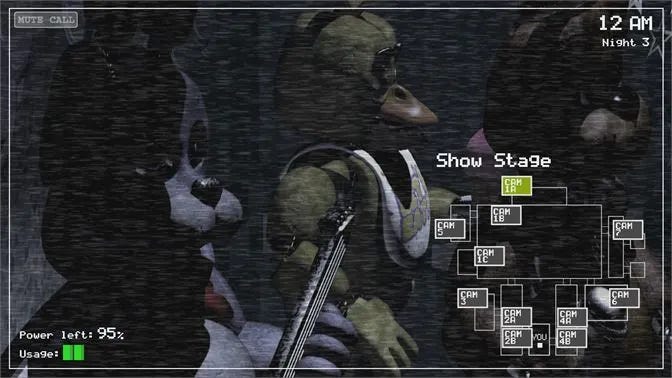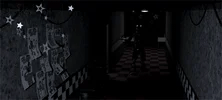When Your Story is Indecipherable
Five Night’s at Freddy’s and it’s elusive lore (Happy 10 year anniversary!!)
As any twenty-something who spent their formative years mostly online, Five Night’s at Freddy’s was (definitely still is) a fairly large part of my entertainment appetite. I distinctly remember watching Markiplier’s play-through of the first game in middle school: me and my brother under a blanket in the living room, watching the gameplay on a small phone screen, and the blanket getting thrashed with every jump-scare.
For those unfamiliar (welcome to the cult!) Five Night’s at Freddy’s is a survival video game series developed by Scott Cawthon where you must strategize to survive against nightmare inducing animatronics for, you guessed it, five consecutive nights. However, the intellectual property has long since expanded from just video games to multiple book series, merchandise, and most recently a feature-length film staring Josh Hutcherson.
Over the course of the nine official games and a couple of spinoffs (as of writing), many people have attempted to uncover the storyline that connects all these games together, with varying degrees of success (poor MatPat). This is because within the first five minutes of loading up the first game the voice that speaks to you (dubbed Phone Guy) drops so many hints into the story of the world of Five Night at Freddy’s, however that’s all he really does. That’s all that really happens over the course of franchise: hints and carefully collected clues either in dialogue or gameplay that when put together don’t create an easily digestible story. This is why people still theorize about the games today and why there is not a widely agreed upon canon and timeline, though Game Theory’s videos are the most popular explanations.
Will I be undertaking explaining the Five Night’s at Freddy’s lore today? Heavens no. But, as a writer myself, I’m interested in exploring the mechanics of this kind of storytelling and positing whether the story’s confusion is a genius marketing strategy or clumsy writing, and if eventually the tangled yarn that is the lore of this game series will drive the very people who loved it so much, away from it in the future.
What is the first game about?
The plot of the first game is simple: a security guard works to avoid being killed by animatronics for five nights (or more if you hate yourself). The story of the first game, is primarily conveyed though Phone Guy’s messages to the player character, which we learn is named Mike Schmidt through the paycheck at the end of the game. Mechanically, these messages teach the player how to play the game and build up to a scare on the fourth and fifth night but from a story-telling standpoint the messages build the world of the universe the game takes place in. Through these messages we learn about Freddy Fazbear’s Pizza, a Fazbear Entertainment location that we, the player, work at. We learn about the infamous Bite of ‘87, when an unspecified person was hurt by an unspecified animatronic but managed to live without a frontal lobe and that the animatronics we are tasked to watch over: Freddy, Bonnie, Chica, and Foxy, will try to make their way into our office to stuff us into an animatronic suit (effectively killing us). Why are these robots so blood thirsty? And why is there a weird yellow bear that crashes the game? Using the security cameras, we can find articles that talk about five missing children who were lured into the back rooms by someone dressed as one of the mascots. With another report talking about the increasingly bad odor of the animatronics, the game ambience incorporating groans and moans, and the sounds of childish laughter strewn about the game, its easy to reach the conclusion that the mascots of Freddy Fazbear’s Pizza are haunted by the spirits of children.
What Went Wrong?
The main issue with the clarity of the franchise is that each game tries to move the story along or branch it off in different ways without either establishing the necessary knowledge to extrapolate the narrative or giving clues that are so cryptic its hard to understand what they are applicable to (looking at you Midnight Motorist). Add in that the book series, games, and now movie are all giving the audience different stories and understandings, its easy to comprehend how we got to this point. What is the chronological order of the games? Who was involved in the Bite of ‘87? Who do we play as in the games? Is Gregory a robot child? Who is the crying child and was FNAF 4 a dream? WHAT IS IN THE BOX? Each game tacks on new questions and new threads to follow without really affirming the truths in the past games.
Is That the Appeal?
Part of the fun of the games is the community around it. Every new installment is full of potential to add clarity to everything before and to give fans something new. People theorizing about the franchise is entertaining and so it makes for great content when there are not new games to play, keeping the franchise circulating within popular culture. So it seems that having an ever puzzling product that requires easter egg hunting and deciphering would be a good thing to make. And I do believe any story should have some level of mystery and intrigue in it; it keeps conversations about the work flowing.
So is it on Purpose?
Well, only Scott Cawthon and Steel Wool Studios know the true answer to that question. Call me naive but I don’t think Scott Cawthon meant for the franchise to end up this way. I think the series suffers from an author who had an idea planned out (at least for FNAF 1) and with the success of this idea tried to craft a larger story as he created more games, leaving clues for an audience to piece it together that only really make sense knowing the full context rather than being out of the loop. And believe me I’ve been there. In a recent workshop, I presented a series of poems that I believed were clearly about caves, but realized very quickly that my passion and research prevented me from creating work that was accessible to everyone else. I assumed that everyone knew as much as I did and thus they would be able to understand my metaphors and allusions, when really all I did was leave my colleagues intrigued but utterly confused. When I look at my own attachment to the franchise and what others voice online, I see the same thing. People are passionate, attached, and intrigued; but horribly confused.
Does the Novelty of Confusion have an Expiration Date?
Within the media of video games, I don’t necessarily believe that to be the case. Games like Legend of Zelda, Portal, and Kingdom Hearts have confusing lore and they continue to be beloved. Whether or not people are fatigued by the indirect storytelling of other games in the “Mascot Horror” genre is another question. For Five Nights at Freddy’s, I believe the games will continue to be confusing and at times convoluted but I’ve made my peace with it and I suspect that a lot of people have after FNAF: Help Wanted and Security Breach respectively. The books carry more narrative coherence because they simply have to in order for the book or book series to work. The same thing can be said about the cinematic universe. While video games have the capacity to have fully developed, clear, and intriguing stories, I think the medium of video games gives creators the option to craft a story or not and still be able to make something profitable and culturally significant. In my opinion, video games have to have captivating plots in order to gain players, but don’t have to have a good story. In fact, it might be just as profitable if not more to let the fans create the story themselves (see Minecraft for example).
Are you a FNAF fan? Do you like horror media? What do you make of story vs plot within video games?
Stay artfully curious,
Hachi





As a former fnaf-and-matpat-obsessed kid this post made me so excited. Fnaf lore is truly insane and I love it.
As someone who really hasn't heard of FNAF, how can I check out the game? What platform? It sounds interesting to say the least.